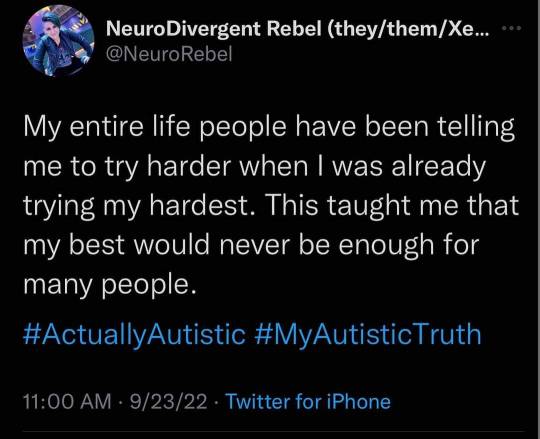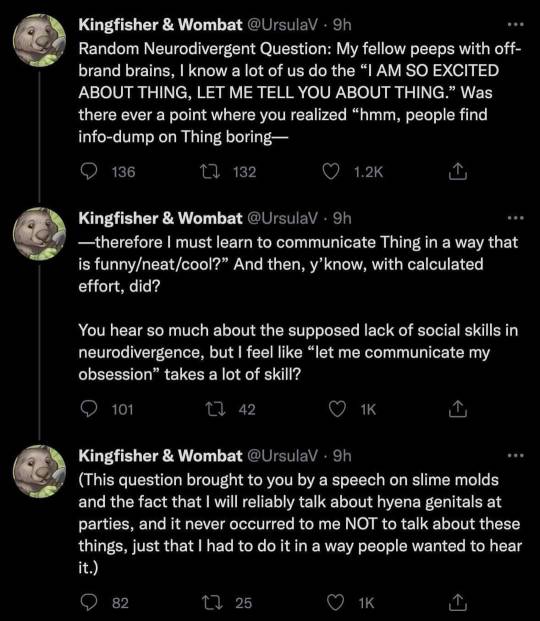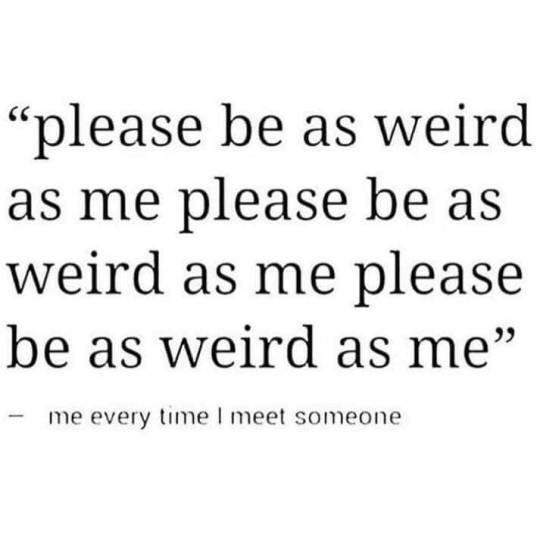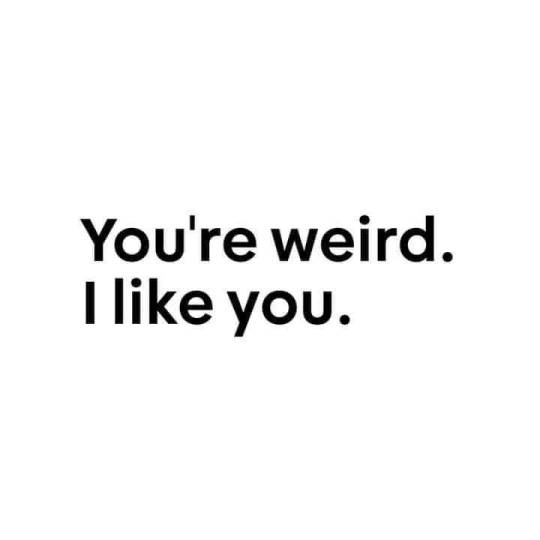#but everything changed when my mentor coined neurodivergence
Text

Anyway. This is neurodivergent parallel play. Yay!
#ROTTMNT#these good boys#rise of the neurodivergent teenage mutant ninja turtles#the ninja turtles are autistic#parallel play#being neurodivergent#cryptid culture#weird as us#how do you do fellow humans#being autistic and adhd with processing disorders is a neat trick#but everything changed when my mentor coined neurodivergence#the changeling theory of autism#adhd is autism's excitable twin
3K notes
·
View notes
Text

Alan Jack @alanjack Replying to @fochti
I still don't know why part of autistic/adhd diagnosis isn't putting you in a room with someone already diagnosed and seeing how quickly you bond.
47 notes
·
View notes
Text

"My entire life people have been telling me to try harder when I was already trying my hardest. This taught me that my best would never be enough for many people."
-Neurodivergent Rebel
540 notes
·
View notes
Text
Nick Walker on FB:
You may recall that last month I was one of six autistic scholars who published a letter (really more of a brief article) debunking transphobe Judy Singer's claim to have invented the concept of neurodiversity, which was actually developed by a small collective of early online autistic community-builders.
Here's a new article about the whole thing, including a couple of quotes from me toward the end (and the inevitable transphobic comments about me from Singer).
Good article, on the whole. I have only one point of dissatisfaction with the reportage: although Singer's claims to have invented the whole concept of neurodiversity are well-documented (in her own book, even), she tries here to walk back that claim by saying that she may not have single-handedly invented the concept of neurological diversity, but that she was the first one to coin and publish the actual word "neurodiversity." But even this isn't true; journalist Harvey Blume was the first one to publish the term, in an piece in The Atlantic inspired by conversations with the early autistic activists who developed the concept. I do wish the article had mentioned this fact!
#internalized ableism#actually autistic#nick walker#but everything changed when my mentor coined neurodivergence#i didn't know judy singer is a terf
8 notes
·
View notes
Text

53 notes
·
View notes
Text
Shared from the Facebook of longtime activist Giraffe Party.

Reviving a post from last year…
Just because there were less people being identified as - let alone diagnosed - as autistic before last year, or ten years ago, or 99+ years ago doesn't mean the ratio of autistic to non-autistic people has drastically changed... it only means the ratio of formally diagnosed autistic people to informally identified autistic and non-autistic people has changed.
Inspired by an older meme involving a mountain, I decided to put another spin on this because I love me some space humor (and it's a bit more chronologically appropriate than the mountain)...
(For the record… the first “official” known diagnoses of autism - “Autistic Disturbances of Affective Contact” - was in an article by Leo Kanner, published in 1943. And two decades prior, Grunya Sukhareva was leading the way in identifying autism — see link in comments.)
[Image Description - Square image with black background and a colorized photograph of Pluto in the center. The terrain is shown in mostly shades of white and grey, with some ice blue at the very top left section of the sphere and bright reds merging into deeper, richer red shades from the middle left to bottom left and center of the sphere. Text is seen above and below the photograph. The text is a medium sky blue serifed font.
Text above the photograph reads:
"'There was no autism diagnosed before 1930.'"
Text below the photograph reads:
"Pluto was first identified in 1930.
Pretty sure it's been around a lot longer than that."]
https://m.facebook.com/story.php?story_fbid=pfbid02KuZiuRwPUDd3BLnL21Xr9R676P21sH7AiDC71gpoG9vJSWmib7fizJp3arZhAVTvl&id=100063707371602&mibextid=Nif5oz
47 notes
·
View notes
Text
Lost in Translation: The Social Language Theory of Neurodivergence | by Trauma Geek | Medium
Up until now, scientists have studied us like they study animals — not asking our opinion or considering that there may be a complex system of mind behind the behaviors that they do not understand. They theorize that we are less empathetic, less aware of others, less social. More like robots than people.
They have largely not tried to understand the biological mechanisms that create our experience of self. Instead they have tried every means possible to force us to act neurotypical.
#actually autistic#autism is a mobius strip#autism is my whole brain#autism is not an accessory#being autistic and adhd with processing disorders is a neat trick#you can be allistic with processing and sensory disorders#being neurodivergent#but everything changed when my mentor coined neurodivergence#neurotypicals will say we didn't connect shit#we can't all be neurotypical karen
137 notes
·
View notes
Text
I am suddenly reminded of a short story I wrote like ten years ago after my autism confirmation: 2003 Donnie finally getting around to researching ADHD for Mikey and then diagnosing all four of them. Then going on a streak of criticizing the DSVM until his brothers drag him into Mikey's room and pack him in the nest of the bed and then pile on top of him. They don't necessarily sleep. They just talk about ADHD until Splinter yells at them to go the fuck to sleep.
Ideas will continue as they develop.


#tmnt dreams#the ninja turtles are autistic#tmnt mikey has always had adhd#adhd raphael is accepted#thesis#2003 Mikey deserved better#i might write a fic about this#neurodivergent characters#ADHD characters#adhd brain go aaaaaa#but everything changed when my mentor coined neurodivergence
38 notes
·
View notes
Text
Of all the sites to find on the subject, I never expected a damn Neurodiversity Wiki.
I wonder if Kassianne and Ibby Grace know, since it's their coined term, heh.
4 notes
·
View notes
Text
Transcript: ADHD can disrupt adult life: Here’s how to own it | The Nation's Health
In addition to producing award-winning news stories, The Nation’s Health lets you hear directly from the people we’re talking to. In this episode, I’ll chat with Russell Barkley. He is a professor of clinical psychiatry at the Virginia Commonwealth University Medical Center and a leading author and researcher on attention deficit hyperactivity disorder.
We will discuss ADHD in adults — what ADHD looks like beyond childhood and implications for public health.
But, before the call, here’s a primer on ADHD.
ADHD is a common neurodevelopmental disorder. It shows up in early childhood — and it can exhibit itself in a wide range of ways, but there are three main presentations of ADHD — inattentive, hyperactive-impulsive and combined presentation.
The list of symptoms of ADHD is long. But, to provide some examples — inattentive types may have difficulty sustaining attention or make frequent careless mistakes. Those with hyperactive-impulsive presentation can feel as if they are driven by a motor; they may fidget or have difficulty waiting for their turn in social or classroom settings. It’s also common that someone with ADHD will experience a blend of being hyperactive and being unable to focus.
It’s important to note that everyone will experience some of the symptoms of ADHD at some point or another. When we’re talking about an ADHD diagnosis, a person has to have a number of symptoms that have persisted over time. And it rarely develops beyond adolescence. However, just because a person wasn’t diagnosed as a child does not mean that they have not had the disorder.
And with that, Russell Barkley has joined us.
...
How does ADHD affect adults and children differently?
You have to understand that ADHD is a disorder of self-regulation of the executive functions of the brain. And once you assume that then you know that there’s a 30-year span — at least — over which the prefrontal lobes and their executive functions are likely to be developing. And in young children, you may not see as many of the executive deficits apart from the distractibility, the impulsivity, and maybe the hyperactivity.
But as they get older, we start to see problems with time management. Three-year-olds don’t have to have a sense of time. Thirty-year-olds do. We see problems with self-organization. Self-motivation, emotion regulation and control, among others. So with those...those take time to emerge. And the adults are going to have much more difficulty in those areas and a lot less trouble with hyperactivity and with just inhibition per se.
#actually adhd#dr russell barkley#to rename adhd#cognitive attentive tempo disorder#diagnosed adhd in 2002#diagnosed autistic in 2013#born in 1979#you get the idea#but everything changed when my mentor coined neurodivergence
9 notes
·
View notes
Text
From Nick Walker on Facebook:
"The Neurodiversity Concept Was Developed Collectively: An Overdue Correction on the Origins of Neurodiversity Theory."
New brief article by me and fellow neurodiversity scholars Monique Botha, Robert Chapman, Morénike Giwa Onaiwu, Steven Kapp, and Abs Stannard Ashley, published in the academic journal Autism.
Now the growing number of scholars who are aware that the concept of neurodiversity was developed collectively, and that Judy Singer's claims to have invented it herself are false, finally have a peer-reviewed source to cite.
So, yes, you can stop citing Singer as the originator of the concept of neurodiversity (she wasn't even the first to publicly publish the actual term neurodiversity; that was Harvey Blume). Increasingly important, not only in the interest of scholarly and historical accuracy, but also in light of Singer's history of ableism, plagiarism, abusive treatment of fellow scholars, and very public transphobia.
Let's get the truth out there and recognize the concept of neurodiversity as a product of collective creativity rather than continuing to falsely attribute it to a single unethical scholar.
_
#being neurodivergent#but everything changed when my mentor coined neurodivergence#sensei nick Walker
2 notes
·
View notes
Text

https://facebook.com/story.php?story_fbid=pfbid0eLTf1poaMsz9UvLM8NzcYQjT32uGgAhCd2kxomAZ6aMgXqhnLJpJawjvFuUy6ywFl&id=100063454634557
11 notes
·
View notes
Text


#my autistic activist friends#we have fun here#weird as us#the changeling theory of autism#but everything changed when my mentor coined neurodivergence#adhd brain go brrr#being a cryptid
20 notes
·
View notes
Text

"Neurodiveristy affirming classrooms need resourcing and support but at their core is an affirming teacher who believes that every student wants to do well and it's the teacher's job to try to help them (note- 'doing well' is different for every child).
Thanks, Em! NeuroWild"
https://m.facebook.com/story.php?story_fbid=pfbid0adWqeUvEupvpUCCCGS375QQdmWczwjeGfGexUUn5MVpsEmonzxtXGYBhiJbuvz1al&id=100090241025969
3 notes
·
View notes
Text
From Joe James The Autistic Photographer on Facebook:
Neurodiversity is ALL brains including Neurotypicals.
Neurodivergent is everyone who is not Neurotypical.
13 notes
·
View notes
Text
https://m.facebook.com/story.php?story_fbid=pfbid0QoYpXhWs7MQduvCaUUuQSwTRW284xbjqPA4FccP57gm78i8A9XuBpG5cTspbWU43l&id=100083716040645
🌻 I’m not arguing, I’m curious….
** Authors note, Please share directly from my page for this article **
I have been told I am rude and argumentative my entire life simply because I ask a lot of questions.
I am not asking to because I am trying to be rude.
I am not asking because I am trying to challenge you.
I am not asking because I am trying to start an argument and make you feel small.
I am asking because I am interested.
I ask because I want to learn more about what you have shared.
I am asking because I need to understand something from all different perspectives.
I ask because I am Autistic and I have endless curiosity and love to learn about the world around me.
I was the child who was removed from Sunday school and sent to colour in pictures of Jesus in the hall when I asked too many questions about God.
I was called ungrateful when I cut open the legs of my new Barbie doll to find out why her knees clicked when you moved her legs.
Why is curiosity perceived as a challenge?
As a teenager, I was sent out of a physics lessons because I asked a teacher if they had learned from experience or just from a book?
I was suspended from school because I questioned the school policy and the 60 year old principals ability to understand a situation from a 16 year old perspective.
As an adult, I pursued investigative journalism because it was a pathway for me to be able to ask ALL the questions.
I found so much joy in sitting down with someone for hours and learning everything about their life and being able to share their story.
Yet, what I don’t understand as an adult, is why asking questions is met with so much defence and aggression.
Why is it perceived as a challenge to someone's authority?
Is this because knowledge is considered a form of power and they want to hold onto it?
Is it because they are uncomfortable being vulnerable?
Regardless of people’s defence and desire to call me rude and argumentative, I will forever be the person to keep asking questions because when we stop asking why, we lose our sense of wonder and life becomes stagnant.
“Curiosity is, in great and generous minds, the first passion and the last. - William Samuel Johnson
6 notes
·
View notes